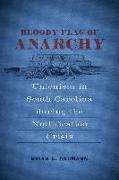Bloody Flag of Anarchy
BücherAngebote / Angebote:
Generations of scholars have debated why the Union collapsed in 1860-61. "Bloody Flag of Anarchy" instead turns this question on its head, asking how the fragile Union held together for so long. It grapples with this question by reexamining the nullification crisis, one of the greatest political conflicts of the antebellum era. The country, it reveals, came perilously close to civil war during the winter of 1832-33. Twenty-five thousand South Carolinians volunteered to defend the state against federal "tyranny, " while President Andrew Jackson vowed to march 200, 000 troops into the state to crush the incipient rebellion. Although South Carolina's radical Nullifiers claimed to speak for all "true Carolinians, " the Palmetto state was bitterly divided. Forty percent of voters rejected nullification, and roughly 9, 000 men volunteered to fight against their fellow South Carolinians to hold the Union together. "Bloody Flag of Anarchy" examines the hopes, anxieties, and ideals of these Union men. It argues that they viewed the Union as the "last hope of liberty" in a world dominated by despotism-as a bold yet fragile testament to humanity's capacity for self-government. They believed that the Union preserved both liberty and slavery, ensuring peace, property, and prosperity for all white men. Nullification, they feared, would provoke social and political chaos: shattering the Union, tearing the social order, and inciting an apocalyptic racial war. For some readers, this book will serve as an introduction to the nullification crisis, a pivotal yet largely forgotten moment in American history. It will also appeal to specialists in many fields of nineteenth-century American history. It reframes the nullification crisis, providing fresh insight by focusing on the internal divisions within South Carolina rather than the tension between South Carolina and the federal government. It builds on the work of Gary W. Gallagher and others who study Civil War-era Unionism by investigating what the Union meant to Americans in the Jacksonian era. It also serves as a valuable resource for historians of gender, as I foreground the ways both parties deployed conceptions of manhood to mobilize their voters. Many Union men, it reveals, pushed back against nullification by appealing to moderate manhood, insisting that "true men" would protect their families from the horrors of disunion. Finally, scholars of transatlantic history will benefit from the book's analysis of the connections between nullification and the European revolutions of 1830. Union men, it contends, viewed the nullification crisis against the backdrop of global history, and they feared America might fail at the very moment the world needed its example the most"--
Folgt in ca. 15 Arbeitstagen
